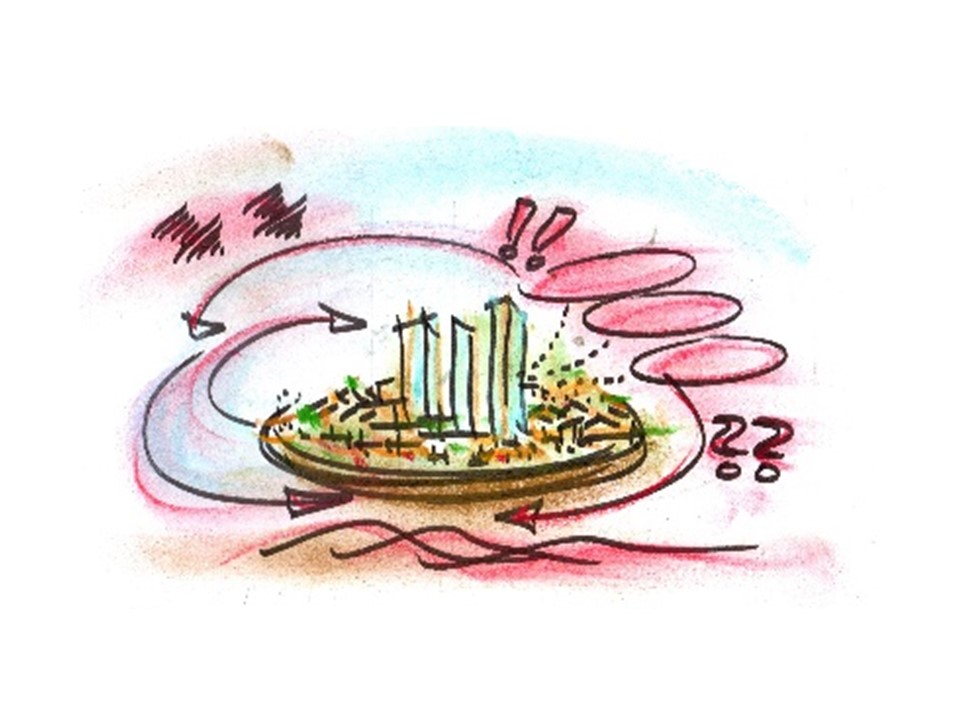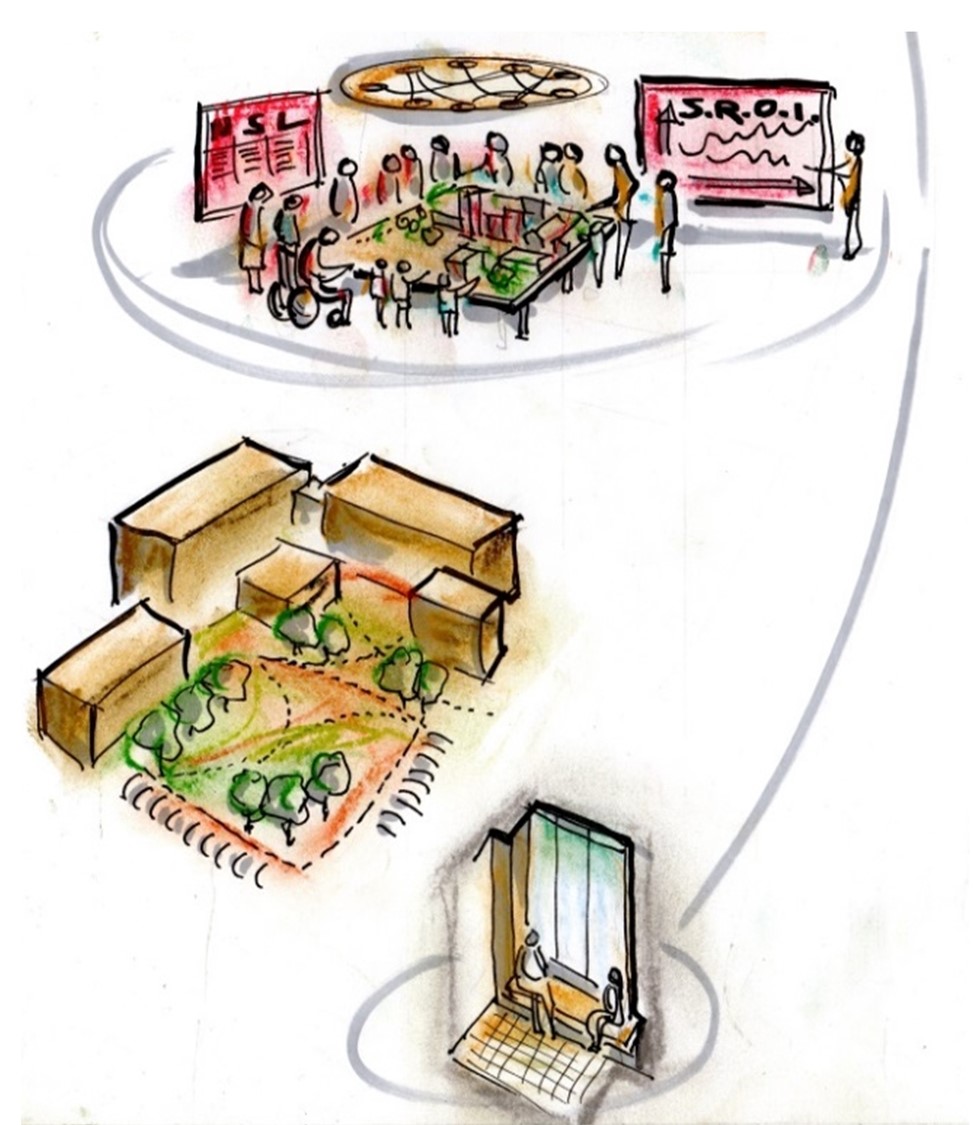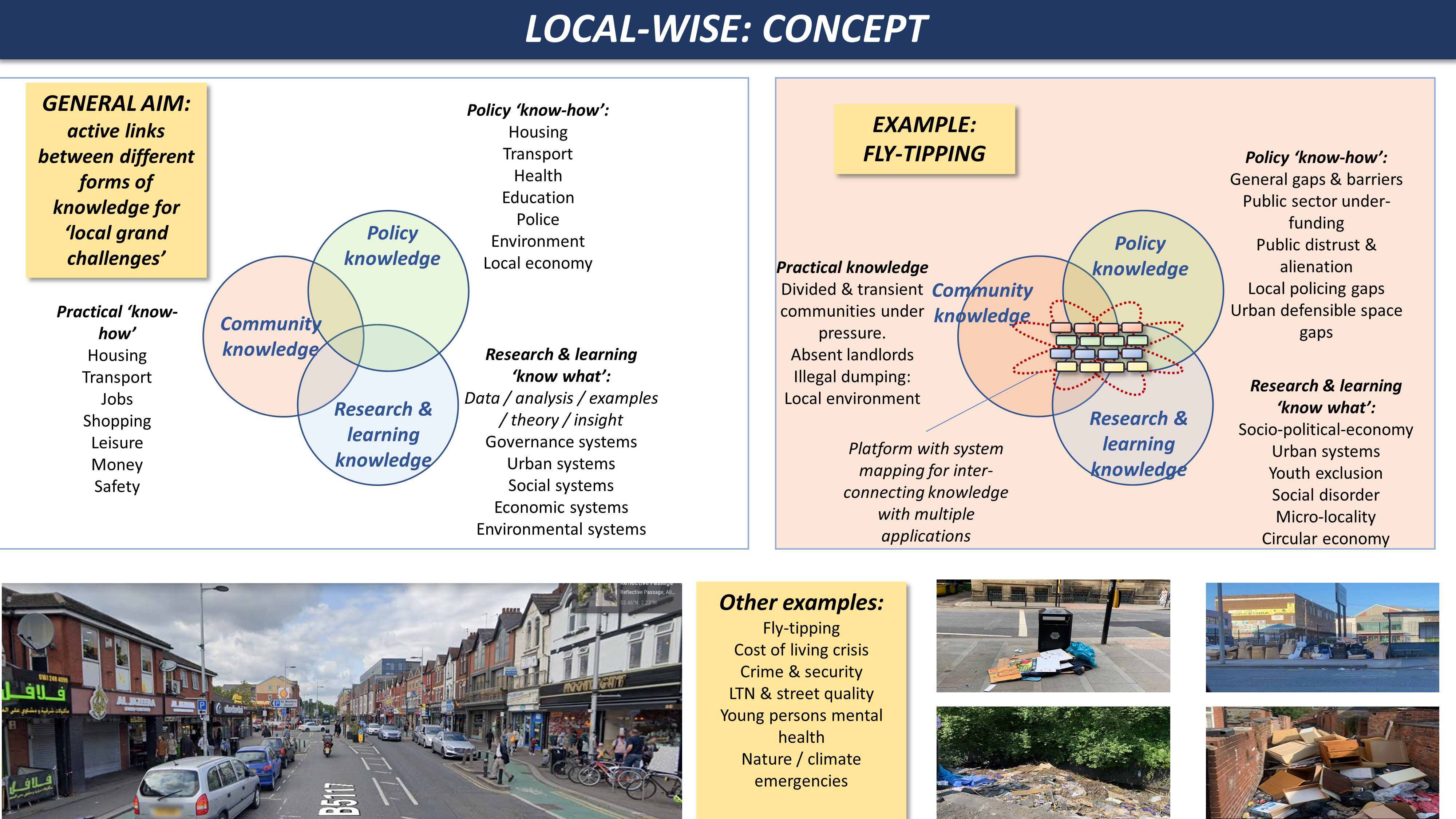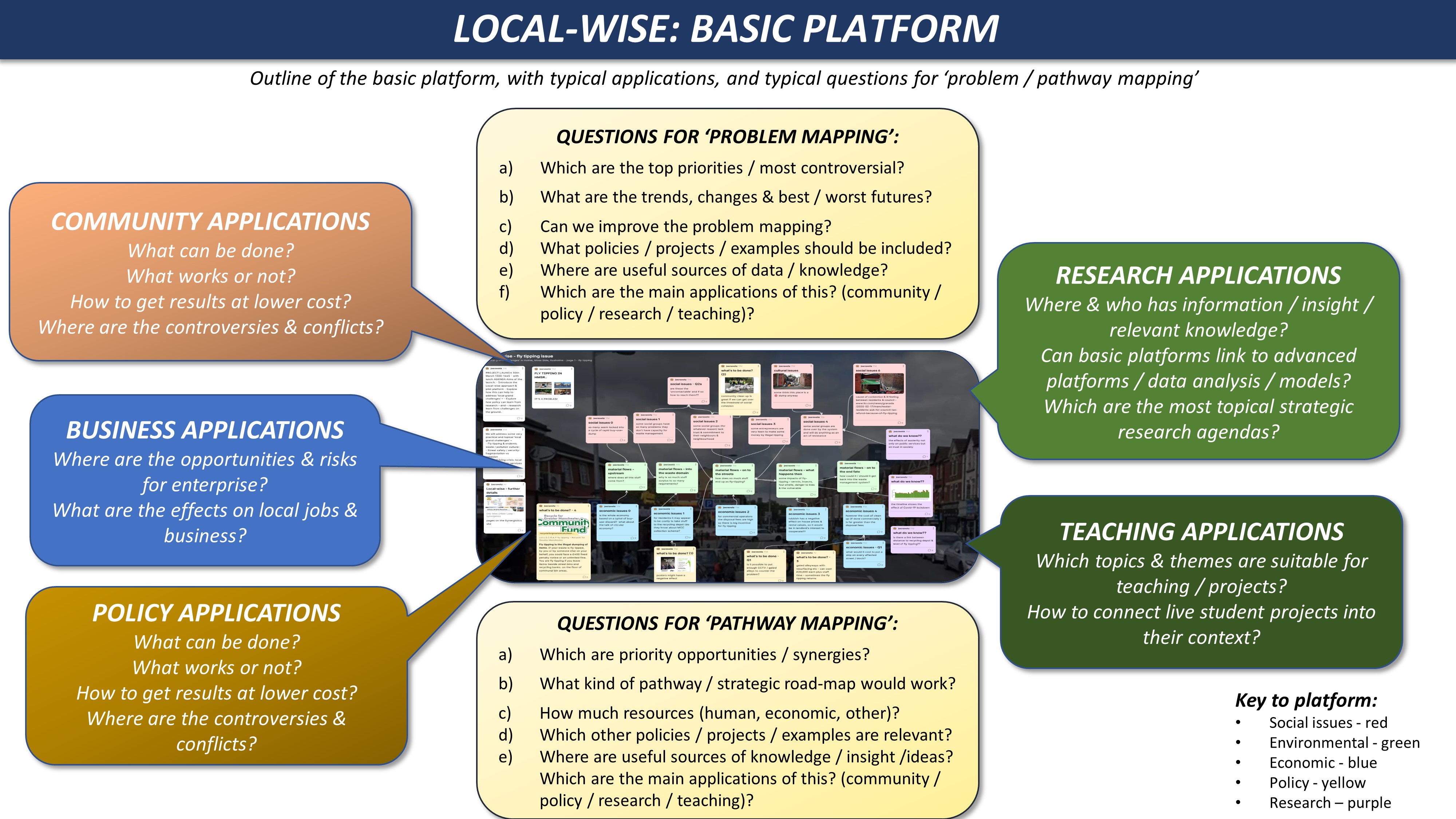Local-wise
(‘Urban participatory research’ & ‘knowledge co-production’)

OVERVIEW
Local wise is a pilot project on ‘local grand challenges’ – endemic problems which seem near-impossible to solve. Fly tipping, the cost of living crisis and other examples, each call for a ‘collective local intelligence’ which is so often missing – i.e. the learning and communication and collaboration between organizations, and between public / private / civic / research sectors.
The Local-wise approach looks for ways to bridge these gaps. It sets up an experimental space, a laboratory for collaboration (i.e. ‘collaboratorium’). The Local-wise platform provides a mapping of complex problems, with different viewpoints from different stakeholders, and with vital links to knowledge, ideas or examples. This is then a practical resource for all sides –
- policy & community applications: stakeholders can better see a joined-up picture of the problems, and in a later phase, the practical responses and pathways, for these ‘local grand challenges’.
- research applications: with the system mapping as a practical navigation tool, we can better locate sources of information or insight, explore questions and differences, and form strategic research agendas.
- teaching & learning applications: we can see the strategic context so that student projects on a ‘service learning’ basis can be more effective.
The Local-wise is also a pilot for a next generation civic university, or ‘multi-versity’. Here the specialized knowledge inside can be put to good use in the community around – and such knowledge is then enhanced by these real-world connections. Likewise, local policy and services should be enhanced by access to state-of-the-art knowledge and insight.
In this pilot phase of the Local-wise, UOM is working with the Manchester City Council Neighbourhoods Team in the adjacent wards of Hulme-Moss-Side-Rusholme (HMSR), some of the most diverse inner-city neighbourhoods in the country.


Method & platform
A pilot platform for ‘knowledge co-production’ is now up – local-wise-fly-tipping-issue – comment & feedback is welcome.
The content so far is based on research-policy discussions so far. The format is a ‘causal mapping’ of a complex system, with layers for the material flow (upstream to downstream): along with social issues (red), economic issues (blue), policy issues (yellow), and the knowledge base (lilac).
Participants are invited to put in new tabs, comments & queries on existing tabs, blogs, slides, papers, links, or other media. In the workshop room F2F discussion may work better, using post-it notes on a template, to be uploaded online later. There are questions to be addressed for each case study, both ‘problem mapping’ (phase 1) and ‘pathway mapping’ (phase 2):
QUESTIONS FOR ‘PROBLEM MAPPING’:
- Which are the top priority / most controversial problems?
- What are the trends & possible futures?
- Can we improve the problem mapping, from causes to effects?
- What policies / projects / examples should be included?
- Where are useful sources of data / knowledge?
- Which are priority applications of this (community / policy / research / teaching)?
QUESTIONS FOR ‘PATHWAY MAPPING’:
- Which priority opportunities / stakeholder synergies?
- What kind of pathway / strategic road-map would work?
- How much resources are needed (human, economic, other)?
- Which other policies / projects / examples are relevant?
- Where are useful sources of knowledge / insight /ideas?
- Which are priority applications of this (community / policy / research / teaching)?

Background – local challenges / global significance
The Local-wise starts from collaboration with local stakeholders, via the MCC ‘Team Around the Neighbourhood’ (TAN) for Hulme / Moss Side / Rusholme (i.e. the adjacent areas to the UOM main campus). This TAN is one of the furthest advanced of any in the UK, for the integration of disparate services in a diverse and problematic area. We aim to address some very practical and topical ‘local grand challenges’ – bundles of problems, both practical and systemic, beyond simple analysis or solution: for example-
- Fly tipping & illegal dumping: a combination of material cultures, fragmented and transient communities;
- Street safety / security: lack of social cohesion in a city of strangers: under-funded policing: underlying divisions of gender, race and ethnicity.
- Cost of living crisis: effects of austerity, loss of local livelihoods and community structures, uncoordinated public services, etc
For each of these, the Local-wise approach can be a powerful enabler of strategic thinking and action. Using the visual thinking / cognitive mapping platform, we can look beyond the normal boundaries of policy departments or research fields:
- further – upstream causes & downstream effects of the problem on the table;
- wider – extended community of stakeholders, with different systems and agendas;
- deeper layers of value and meaning (social, technical, economic, environmental, policy, cultural etc)
Why do this? Overall we think there is great potential for ‘doing things better’ –
- each of these ‘local grand challenges’ shows typical barriers, inertias, knowledge gaps, skills and resources gaps etc;
- to move beyond the gaps, towards potential synergies and collaborative action (‘co-production’), we need better ways of mapping (just as a map helps to plan a journey): and better ways of ‘co-designing’ practical pathways in challenging situations;
- this project is a small pilot and demonstration of a ‘knowledge co-production’ platform in development. This aims to help build bridges between academic & policy knowledge (a future phase will address ‘citizen and business knowledge’ more directly).
Project Brief
The ‘Local-wise’ program, (funded by the ESRC participatory research program), has two main aims:
- External – demonstrate a knowledge exchange & co-production platform, to link UOM and policy / service providers, locally and city-region wide;
- Internal – promote the practice of ‘participatory research’, with the skills and resources needed, within MUI, UOM & partners.
These will be provided via three main actions:
- Demonstration of knowledge co-production / participatory research, via short pilot project & platform, which points to further funding;
- Training: provide an outline of good practice in participatory co-production, for future research proposals and funding programs;
- Evaluation: outline assessments of some example recent projects, with a framework which builds on the above, and validates the agenda for institutional learning.
The expected benefits and outcomes include:
- for policy-makers / service providers: mobilize & apply research knowledge to address ‘local grand challenges’;
- for researchers / knowledge managers: explore & learn from the complexity of ‘local grand challenges’, with knowledge co-production & participatory research methods (also with benefits to teaching & learning, as above)
